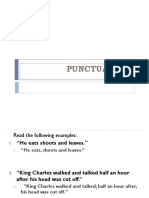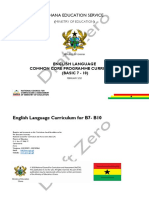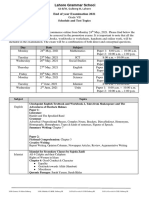Sentence Structures: 1. Simple Sentences
Uploaded by
LUI YIU SHINGSentence Structures: 1. Simple Sentences
Uploaded by
LUI YIU SHINGHKSYCIA Wong Tai Shan Memorial College
School Year 2019/2020
Secondary 4 English Language
Name: ______________________ Class: F.4_____ ( ) Date: ________________
Sentence Structures
1. Simple Sentences
Simple sentences contain a subject and a verb.
Examples:
• Henry goes swimming every Sunday.
(subj.) (v.)
• Sally and Heidi waited for the bus at the terminal.
(subj.) (v.)
• Peter handed in his homework late.
(subj.) (v.)
2. Compound Sentences
Compound sentences contain two simple sentences and a conjunction.
(***Conjunctions: for, and, nor, but, or, yet, so)
Examples:
• Jonathan has just had his dinner but he is still hungry.
(simple sentence 1) (conj.) (simple sentence 2)
• Mary likes dancing and John likes skiing.
(simple sentence 1) (conj.) (simple sentence 2)
3. Complex Sentences
Complex sentences are made up of an independent clause and a dependent clause.
A dependent clause is a clause that cannot stand alone.
Examples:
• Although Linda was exhausted, she tried her best to keep working.
(dependent clause) (independent clause)
• George is absent because he has caught a cold.
(independent clause) (dependent clause)
• If I were you, I would not take his advice.
(dependent clause) (independent clause)
Exercise 1
Read the simple sentences below. Underline the subject and circle the verb in each sentence.
Example: Peter is my classmate.
1. Fiona and I played hopscotch at recess yesterday.
2. The computers are out of order.
3. Looking after kids is a tiring job.
4. The police patrol in the city to keep citizens safe.
5. Fiona has decoded the passcode of the server.
Exercise 2
Read the compound sentences below. Circle the conjunction and place each independent
clause in parentheses. Also mark the subject in each clause with an ‘S’ and the verb with a ‘V’.
Example: (Tom washed the scallops) and (Thomas wrapped them in bacon).
S V S V
1. Every student should complete the task before recess, or they will get punished.
2. Mary and David can cook Western dishes, but they can’t make desserts.
3. Michael cleaned the kitchen and Judy vacuumed the apartment.
4. Barry does not read books often, so he is weak in English and Chinese.
5. Clarice has numerous friends, yet she feels lonely.
Exercise 3
Read the complex sentences below and underline the dependent clause from the sentences
below.
Example: Miss Chan, who is my class teacher, teaches us English.
1. No one likes to hang around with Jason since he loves playing tricks on his friends.
2. Kelly switches off the mobile phone before the exam starts.
3. If the weather is fine tomorrow, we will have a barbecue.
4. I give this doll which I make myself to my mum as her birthday present.
5. Mr. Smith does not donate a cent to the charity although he is the most wealthiest person
in Hong Kong.
Exercise 4
Read the sentences below and decide whether they are simple sentences, compound sentences
or complex sentences. Write ‘SS’ for simple sentences, ‘CS’ for compound sentences and ‘XS’
for complex sentences in the spaces provided.
Example: I am a student. SS
1. Miss Chan teaches us English and she is our class teacher.
2. Harold was surprised when he received a gift from his friends.
3. Olivia proofread her answer after she finished all the questions.
4. Being a student, you should always pay attention in class.
5. Diana does revision diligently, but she fails in her test.
6. Amy buys a new smartphone from the Apple store.
7. Mary has to get up at 6, or she will be late for work.
8. This house is expensive, yet it is small.
Exercise 5
Expand the following simple sentences into either compound sentences or complex sentences.
Example: I am a student.
I am a student who studies in Wong Tai Shan Memorial College.
1. Kelly bakes a cake.
________________________________________________________________________
________________________________________________________________________
2. Johnson watched a movie.
________________________________________________________________________
________________________________________________________________________
3. Rene jogs in the park.
________________________________________________________________________
________________________________________________________________________
4. Mrs. Green sets off to Tokyo.
________________________________________________________________________
________________________________________________________________________
You might also like
- Koshur Samachar - Kashmiri Sahayak SamitiNo ratings yetKoshur Samachar - Kashmiri Sahayak Samiti28 pages
- Grade 10 National Listening Comprehension Practice Second Semester100% (1)Grade 10 National Listening Comprehension Practice Second Semester4 pages
- English Language Notes - Standard Vii Active and Passive VoiceNo ratings yetEnglish Language Notes - Standard Vii Active and Passive Voice4 pages
- B.Ed (English) - Pedagogy of Teaching English - CourseNo ratings yetB.Ed (English) - Pedagogy of Teaching English - Course6 pages
- FET T2 Week 2 Grade 11 English Home Language Reading and Viewing Summary Writing0% (1)FET T2 Week 2 Grade 11 English Home Language Reading and Viewing Summary Writing6 pages
- English Grammar For Class 3 With AnswersNo ratings yetEnglish Grammar For Class 3 With Answers7 pages
- Maple Leaf International School (class 7) Final Syllabus {Revised}100% (1)Maple Leaf International School (class 7) Final Syllabus {Revised}3 pages
- Unit 4 - Participles and Participle PhrasesNo ratings yetUnit 4 - Participles and Participle Phrases4 pages
- Question Paper of English 20 January - Grade 6No ratings yetQuestion Paper of English 20 January - Grade 66 pages
- Reading - Cas - Text Structure and PurposeNo ratings yetReading - Cas - Text Structure and Purpose5 pages
- Final Sherlock Holmes and The Mystery of The Aquilla Diamond33% (3)Final Sherlock Holmes and The Mystery of The Aquilla Diamond8 pages
- Ges New Jhs Syllabus English CCP Curriculum For b7 10 Zero DraftNo ratings yetGes New Jhs Syllabus English CCP Curriculum For b7 10 Zero Draft124 pages
- 'By or Until?' - English Quiz & WorksheetNo ratings yet'By or Until?' - English Quiz & Worksheet1 page
- Worksheet-1 (Tenses) : Complete The Following Sentences Using An Appropriate Verb FormNo ratings yetWorksheet-1 (Tenses) : Complete The Following Sentences Using An Appropriate Verb Form6 pages
- English Language (Syllabus 1184) : Singapore-Cambridge General Certificate of Education Ordinary Level (2023)No ratings yetEnglish Language (Syllabus 1184) : Singapore-Cambridge General Certificate of Education Ordinary Level (2023)12 pages
- LGS Grade VII Musa Murtaza Final Exam 2021 Schedule & Test Topics Grade VIINo ratings yetLGS Grade VII Musa Murtaza Final Exam 2021 Schedule & Test Topics Grade VII4 pages
- Charles by Shirley Jackson - Story and Comprehension QuestionsNo ratings yetCharles by Shirley Jackson - Story and Comprehension Questions4 pages
- Singular - Plural Nouns Exercises: Answers 1-5No ratings yetSingular - Plural Nouns Exercises: Answers 1-52 pages
- 4-Multiple Choice With Answers-Indefinite-Pronouns100% (1)4-Multiple Choice With Answers-Indefinite-Pronouns2 pages
- English Grade 10 Term Notes For 2024 With Column For DateNo ratings yetEnglish Grade 10 Term Notes For 2024 With Column For Date12 pages
- Compound Prepositions: Aside From Singing, She Also Plays The Piano at The BarNo ratings yetCompound Prepositions: Aside From Singing, She Also Plays The Piano at The Bar2 pages
- Introduction To Phonology: Ling 403/603No ratings yetIntroduction To Phonology: Ling 403/60352 pages
- An Analysis of Collocations Used in Written AssignmentNo ratings yetAn Analysis of Collocations Used in Written Assignment82 pages
- Lesson Plan in English For Grade 2 StudentsNo ratings yetLesson Plan in English For Grade 2 Students5 pages
- Communicative English (Code No. 101) 2023-24No ratings yetCommunicative English (Code No. 101) 2023-2416 pages
- Parallel Structure: Connors Writing CenterNo ratings yetParallel Structure: Connors Writing Center3 pages
- English's Role in Intercultural CommunicationNo ratings yetEnglish's Role in Intercultural Communication19 pages
- Translanguaging Classroom Discourse Pushing Limits Breaking BoundariesNo ratings yetTranslanguaging Classroom Discourse Pushing Limits Breaking Boundaries8 pages
- The Rise Tone in The English and Malay Intonations of Malay Learners of EnglishNo ratings yetThe Rise Tone in The English and Malay Intonations of Malay Learners of English16 pages
- Tense Exercise With Answers: Q1. Choose The Correct Verb From Those in BracketsNo ratings yetTense Exercise With Answers: Q1. Choose The Correct Verb From Those in Brackets7 pages
- AHElect Student Module 5 - Academic Referencing and ProofreadingNo ratings yetAHElect Student Module 5 - Academic Referencing and Proofreading8 pages
- Bonifacio Sibayan Intellectualizationofthe FilipinoNo ratings yetBonifacio Sibayan Intellectualizationofthe Filipino12 pages
- A. Read The Dialogue and Answer The Questions!No ratings yetA. Read The Dialogue and Answer The Questions!3 pages
- Preface and Acknowledgements: Classical Japanese: A Grammatical Compendium Is A Reference Guide To ClassicalNo ratings yetPreface and Acknowledgements: Classical Japanese: A Grammatical Compendium Is A Reference Guide To Classical167 pages

























































































